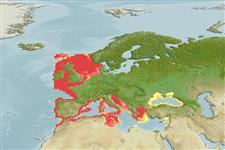Teleostei (teleosts) >
Gadiformes (Cods) >
Gaidropsaridae (Rocklings)
Etymology: Gaidropsarus: Greek, ga, ge = the earth + Greek, ydro = water + Greek psaros = speckled, starling (Ref. 45335).
More on author: Linnaeus.
Environment: milieu / climate zone / depth range / distribution range
Ecology
Marine; brackish; demersal; oceanodromous (Ref. 51243); depth range 1 - 450 m. Temperate; 5°C - 18°C (Ref. 12468); 62°N - 33°N, 10°W - 42°E
Eastern Atlantic: southern Norway, around the western shores of the British Isles to the southwestern European and northwestern African coasts, and southern European coasts in the Mediterranean Sea, into the Black Sea, .
Size / Weight / Age
Maturity: Lm ? range ? - ? cm
Max length : 50.0 cm TL male/unsexed; (Ref. 1371)
Dorsal spines (total): 0; Anal spines: 0. First dorsal-fin ray followed by a few small fleshy filament. Color varies, brown sometimes reddish and with a vermiculated or mottled pattern dorsally. Paler ventrally. The median fin borders dark (Ref. 1371). One barbel on the lower jaw and two on the snout. Marbled coloration on the back (Ref. 35388).
Lives generally at shallow depths near the shores on rocky bottom with aquatic vegetation to 60 m depth. Feeds on fish, crustaceans, worms and algae. Sold fresh in markets, also made into fish meal (Ref. 1371). Caught as a by-catch by various fishing gears (Ref. 35388).
Life cycle and mating behavior
Maturities | Reproduction | Spawnings | Egg(s) | Fecundities | Larvae
Cohen, D.M., T. Inada, T. Iwamoto and N. Scialabba, 1990. FAO species catalogue. Vol. 10. Gadiform fishes of the world (Order Gadiformes). An annotated and illustrated catalogue of cods, hakes, grenadiers and other gadiform fishes known to date. FAO Fish. Synop. 125(10). Rome: FAO. 442 p. (Ref. 1371)
IUCN Red List Status (Ref. 130435)
Threat to humans
Harmless
Human uses
Fisheries: minor commercial
Tools
Special reports
Download XML
Internet sources
Estimates based on models
Preferred temperature (Ref.
123201): 7 - 15.2, mean 10.1 °C (based on 505 cells).
Phylogenetic diversity index (Ref.
82804): PD
50 = 0.5001 [Uniqueness, from 0.5 = low to 2.0 = high].
Bayesian length-weight: a=0.00417 (0.00311 - 0.00559), b=3.08 (3.00 - 3.16), in cm total length, based on LWR estimates for this species (Ref.
93245).
Trophic level (Ref.
69278): 3.5 ±0.3 se; based on diet studies.
Generation time: 1.8 ( na - na) years. Estimated as median ln(3)/K based on 1
growth studies.
Resilience (Ref.
120179): High, minimum population doubling time less than 15 months (Preliminary K or Fecundity.).
Fishing Vulnerability (Ref.
59153): Low to moderate vulnerability (26 of 100).
Nutrients (Ref.
124155): Calcium = 43.1 [21.4, 94.2] mg/100g; Iron = 0.385 [0.196, 0.772] mg/100g; Protein = 17.7 [15.9, 19.5] %; Omega3 = 0.454 [0.229, 0.848] g/100g; Selenium = 21.4 [9.9, 57.2] μg/100g; VitaminA = 7.13 [1.97, 26.65] μg/100g; Zinc = 0.594 [0.413, 0.895] mg/100g (wet weight);
